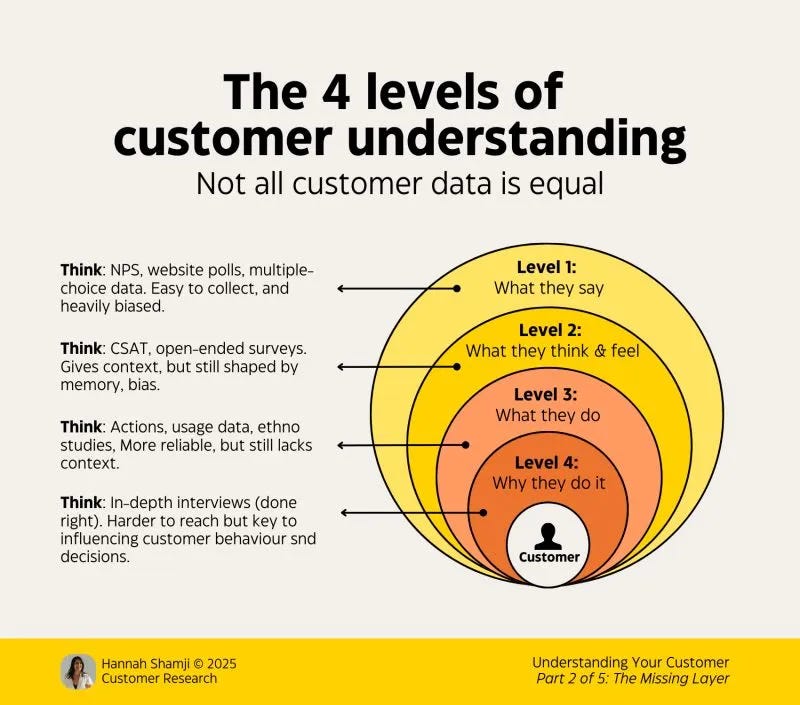52.What is an insight?
Real vs fake insights
When I signed up to complete an Ironman, I thought it was a way to push my body, prove my endurance, and check off an achievement. But as the training started to take its toll on me, I began to see that the real challenge wasn’t physical.
While motivation fluctuates, discipline endures. The daily commitment to train despite discomfort requires mental strength. And that is the real gain from this experience. This revelation changed everything. I realized Ironman wasn't about crossing a finish line. It was about embracing both the agony and ecstasy of the journey itself. What's in the way is the way.
I wonder, if every action we took in our lives were to be based on such deeper insights, how could we do things differently?
It is often said that the foundation of every marketing activity needs to be insight. But in the real world, it rarely is because genuine insight is hard to define.
Insights are often confused with what is obvious or a trend, and they are mostly data points from research. I firmly believe that insight and emotion are inseparable. If an ‘insight’ sounds functional, it’s likely false.
So how do you identify a good insight?
The Insight Litmus Test
Drawing from my experience, I believe a true insight must satisfy the following three criteria:
Create an unexpected shift in how we see the problem
Resonate emotionally, connecting with deeper feelings and motivations.
Reveal a more profound human truth beyond surface-level observations.
Consider my experience with Apple Watch activity rings. Previously, I used fitness trackers that displayed step counts, but they never engaged me like Apple's simple colored circles that show no raw data.
The insight behind Apple's design is that people don't just want to track steps—they want to feel a sense of accomplishment.
Applying the Insight Litmus Test:
Unexpected shift: Instead of focusing on output data (steps, calories), the design emphasizes input behaviors (stand, move, exercise) within our control
Emotional resonance: Fitness isn't just about health metrics—it's about feeling good about ourselves
More profound truth: The most significant barrier to health isn't external but internal—our struggle with motivation and consistency
By contrast, "fake insights" fail these criteria. They typically appear as:
Obvious statements masquerading as discoveries: "People struggle to exercise consistently."
Trends mistaken for insights: "More people are using fitness trackers."
Functional observations lacking emotional depth: "People want better fitness tracking."
So, how does one find real insights about customers?
Hannah Shamji's "4 Levels of Customer Understanding" framework provides an excellent roadmap for insight discovery. Genuine insights emerge at Level 4, where we understand the motivations and pain points driving human behavior.
To reach this understanding, in-depth interviews should explore five critical areas:
How people gather information influencing product choices
Their perception of value (benefits minus costs)
Existing awareness and relationships with category brands
Specific desires they seek to fulfill through product use
Post-purchase behaviors and experiences
Understanding the "why" behind consumer behavior requires recognizing the influence of personality traits, situational variables, and cultural differences. For example, let’s analyse how consumers choose coffee:
• Personality Traits: A person who values sustainability might prefer an organic, fair-trade coffee brand, while a more adventurous personality might like exotic blends
• Situational Variables: A busy professional grabs a ready-to-drink coffee from a vending machine when running late, even if they usually prefer artisanal espresso.
• Cultural Differences: In Italy, coffee culture revolves around quick, strong espressos at a bar, whereas in the U.S., cold, sweet coffee drinks are popular for on-the-go consumption.
This is why multiple in-depth conversations are essential to identify patterns that might apply to broader market segments.
Armed with these criteria and methodology, I hope you are equipped to distinguish genuine insights from fake ones and transform your approach to marketing to your customers.



